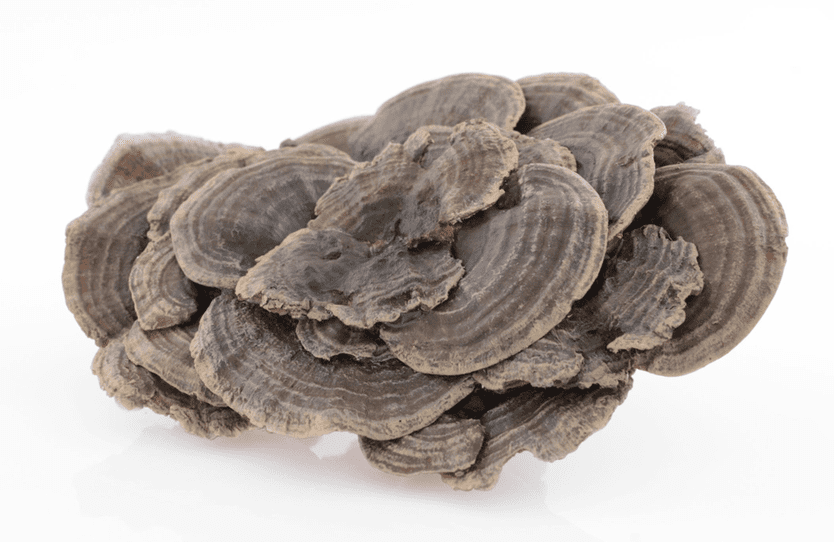The Medicinal Mushroom – Coriolus versicolor (a.k.a. Champignon coriolus, Kawaratake, Krestin, Turkey Tail, Yun Zhi)
Commonly known as the “Turkey Tail” or “cloud mushroom”, this mushroom has recently attracted a lot of attention among the medical community or its anticancer properties. As a general sceptic, I am usually cautious of these claims. There seem to be almost just as many plant extracts and herbs that ʻcureʼ cancer as there are foods and products that claim to ’cause’ cancer. Does this one actually work? I examined the medical literature to find out.
What the Data say
For centuries the mushroom had been used for certain cancers and infections in China and Japan. It was only in the 1970s however, that the medical community started to investigate its properties closely. First studies in cells and animals showed that certain compounds in the mushroom did seem to slow cancer cell growth and improve mortality. But these models are vastly different to humans, and most compounds in drug development fail at this stage when they are tested in humans. The true test came at these clinical trials. What was remarkable was that when they carry out these clinical trials, these mushroom compounds did seem to reduce cancer-associated mortality and improve response to cancer treatments. In fact its extract has since been used as a pharmaceutical grade medicine in Japan. Prescribed as an adjunct to cancer treatment, it has been consistently clinically effective in thousands of patients since its introduction over 30 years ago.
So how does it work?
The exact mechanism of this mushroom still seems to be shrouded in mystery. But two compounds in the mushroom are believed to be mainly responsible for its effects:
– Polysaccharide Krestin (PSK)
– Polysaccharopeptide (PSP)
These compounds slow cancer growth and directly eradicate some cancer cells, while also boosting the immune system so that they too are recruited to destroy the cancer cells. They also reduce the debilitating side effects of chemo/radiotherapy. And all with little to no side effects. Other effects – antibiotic, antiviral, anti fungal and antioxidant – have also been discovered. It has even been shown to clear oral human papilloma virus infections when used in combination with another mushroom-derived compound.
So what does this all mean?
This all sounds remarkable. So why is this not being prescribed more widely now?
To put it simply, it sounds as though there just has not been enough awareness about it outside of East Asia. High quality studies including double blind, randomised, placebo controlled trials (the gold standard in clinical trials) point to the benefits of the mushroom compounds in certain cancers. However while its therapeutic benefits are well-established in Japan, more research with patients of different types and stages of cancer in different continents is needed to have a clearer idea of its effects.
In a paper* that came out last summer (July 2019), a systematic review (a scientific review that directly compares and evaluates results of many different studies) of clinical trials using the mushroom extracts concluded that it could “increase the [overall survival] in cancer patients,” delivering “clinical and life quality benefits for cancer patients with low side effects”. It noted that more research with bigger participants in different continents is needed to fully understand its effects. As scientists unfold the properties of this mysterious mushroom, we will find out whether this really is one of Natureʼs gifts. And more of us may come to benefit from its powers, as many already have and continue to do so in Japan.
References:
*Zhong L, Yan P, Lam WC, Yao L, Bian Z. Coriolus Versicolor and Ganoderma Lucidum Related Natural Products as an Adjunct Therapy for Cancers: A Systematic Review and Meta-Analysis of Randomized Controlled Trials. Front Pharmacol. 2019;10:703. Published 2019 Jul 3. doi: 10.3389/fphar.2019.00703
Coriolus versicolor | Cancer Network. Retrieved June 2, 2020, from https:// www.cancernetwork.com/integrative-oncology/coriolus-versicolor
Coriolus Versicolor | Memorial Sloan Kettering Cancer Center. Retrieved June 2, 2020, from https://www.mskcc.org/cancer-care/integrative-medicine/herbs/coriolus-versicolor
Coriolus Mushroom: Uses, Side Effects, Interactions, Dosage, and Warning. Retrieved June 02, 2020, from https://www.webmd.com/vitamins/ai/ingredientmono-648/coriolus-mushroom Medicinal Mushrooms (PDQ) – Health Professional Version. Retrieved June 02, 2020, from https://www.cancer.gov/about-cancer/treatment/cam/hp/mushrooms-pdq
